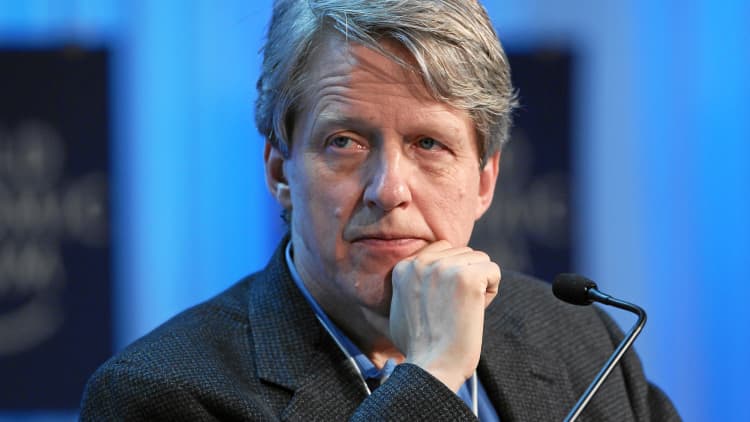
Investor sentiment today is looking like it did in 2000, and that could be a sign markets are in a bubble, Yale professor and Nobel economics laureate Robert Shiller told CNBC on Tuesday.
Just before the dot-com bubble burst, investors had very little confidence in stock valuations, but they were confident in the market in the short term, he said.
Read MoreJeremy Siegel: How a Fed hike could boost stocks
"That's the sign of the bubble. They're worried but they're thinking they'll get out," he told CNBC's "Squawk Box." "This can suddenly turn, and we're looking somewhat like that now."
Shiller raised concerns about the value of U.S. stocks earlier this week when he told the Financial Times his valuation confidence index showed investors believed equities have not been so overvalued since 2000, when the dot-com bubble burst.
The index, based on investor surveys, and also known as the CAPE ratio, compares current stock prices to earnings over the course of 10 years to account for business cycles. CAPE stands for cyclically adjusted price-earnings ratio.
The CAPE ratio is currently at 25, Shiller said, above the historical average of 17. In 2000, it spiked as high as 44 before dropping back down to 13, Shiller told CNBC earlier this month.
Read More Stocks overvalued? Depends on how you read the tea leaves
Shiller said he did not want to be too negative, but said he is more worried about a decline than most people.
"I think the market might do what it did in 2000, which is the CAPE ratio went up. It's 25 now. It could go up to 45," he said.
The CAPE ratio has been criticized by some market watchers for failing to take into account changes in accounting and tax rules as well as the sharp fall in earnings in the wake of the financial crisis.
Shiller acknowledged Tuesday that it is a "complicated world," and he has only been collecting data for the CAPE since the late 1980s.
Read More'Absolutely not': Reaction to Shiller bubble warning
"We don't have that many good experiences to test that out, and 2007 was a very different event than 2000," he said, referring to the last two major stock market corrections.
Still, the CAPE is not the only thing that has Shiller worried. He said the recent extreme stock volatility creates the risk of another major market move downward as investors focus on those price swings.
"It wouldn't surprise me at all," he said. "And then there would be a reaction that people have been thinking about this, and now they'll react more quickly."
Also concerning Shiller is the sustainability of earnings growth throughout the six-year recovery.
"Earnings have grown so rapidly, and history suggests that earnings don't usually keep growing like that," he said.
Earlier on "Squawk Box," Wharton finance professor Jeremy Siegel said he believes stocks could in fact rally if the Federal Reserve pairs its first interest rate hike in more than nine years with dovish language on the future path of monetary policy normalization.
Read MoreJeremy Siegel: How a Fed hike could boost stocks
The Federal Open Market Committee meets Wednesday and Thursday to decide whether to lift its fed funds rate from near zero, where it has held the benchmark rate since December 2008.


